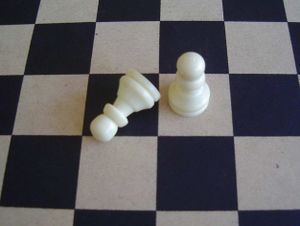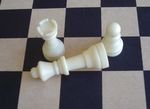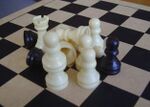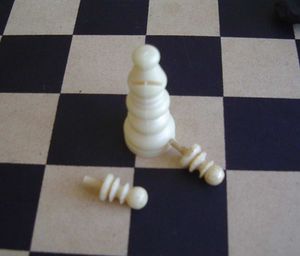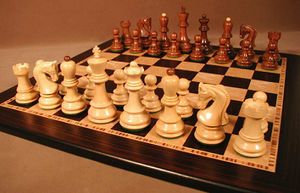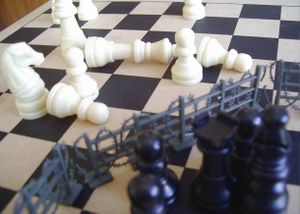Pawnography
Pawnography was the first form of pornography ever invented. The number of moves was endless and the process could take hours to complete, thus it was a huge hit. Practised on or nearby inexpensive and ubiquitous chess boards, the pawnography fad grew to such a height that many of the first (1923) silent films were pawnographic.
History of pawnography
Humble beginnings
Pawnography was invented in the 13th century by a certain Prince Altstock of Denmark as a means to woo his lifelong love Mary Violetta. He would lay down a chess board and show her all his moves. (The King's Gambit was by far his most notable.) What soon followed was a craze that dwarfed the advent of witch trials and soon, masses of repressed blue-bloods from across Europe bought chess boards and the pawnography fad had begun.
Threesomes, queen-on-queen and rookie pawnography were not uncommon on the pawnography scene, but for the truly outlandish (and the English of course!) was the bestiality of knight-on-knight. The pawnography market grew more and more over the decades. Like an addictive drug, it reached its chequered hands from the north to the south and from the West to the Far East (although Asian pieces were quite small and harder to see). This golden age of pawnography was known as "The Golden Age of Pawnography". Indeed, pawns with strap-on dildos and bondage sets with vibrating boards ... Anyway, business was booming.
The pawnographic Dark Ages
However, the pawnography era came undone in the late 1300s with the advent of child pawnography. At the same time, the Black Plague swept across the lands and the two were connected as a sign from the gods condemning this new addition to the pawnography market.[1] As the Black Plague killed hundreds, towns held group flagellation sessions in local churches where those who had partaken in the vile act would beat themselves with their chess boards. After each session, the boards and their pieces would be burned. Because of this ritual elimination and confiscation of all pawnographic paraphernalia from the period, a 14th- or 15th-century chess board is extremely rare and worth thousands today.
And thus, pawnography fell into oblivion for the next 250 years. Although some small, rebellious cults kept the practice alive, nothing more was heard of pawnography until the early 1700s when a cache of pawnographic material was found stashed in a basement in Italy. The valued worth of the pieces were estimated at $14.95 and were subsequently placed in the national museum for further study. Over the next ten years, a sole archaeologist, Dr. Harold Martello, chipped away at the enigma that was pawnography. Unfortunately, he went blind before he could complete his work[3] and his notes were misinterpreted as porn. This new "pornography" was discarded as an inferior pastime, didn't take off and nothing has been heard of it since.
Luckily, another scientist corrected the mistake and correctly identified Martello's research as "pawnography". Once again, the art was reborn. Just like in the Golden Age, pawnography flowed freely throughout the lands and reached the remotest corners of the earth. Men pleasured themselves with hours of fun for the whole family, reprising such historic moves as "Rook does Queens" and "Pawn on Pawn loving".
Racial segregation in pawnography
Once again, fate conspired to destroy pawnography, this time in the form of the racial segregation. Up until the mid 1800s, the only pawns made were white. Queens were white, kings were white, bishops were white, and all the squares were white ... everything was white![4] With the accumulating number of blacks in America,[5] the stage was set for a massive conflict: the American Civil War. The North wanted to manufacture black pawns and black knights,[6] whilst the South wanted only white pawns to be made. The war raged for years, turning neighbour against neighbour and brotha against brotha. The culmination of this ended with the Battle of Gettingsomeburg, where the South was vanquished utterly and the war was won. Ever after that decisive turning point in the history of pawnography, blacks now think they're not persecuted, when nothing's really changed.[7] In any case, black pawns were allowed in and new experiences in pawnography arose, such as bi-racial orgies and the "Black Pawn's opening".
Pawnography today
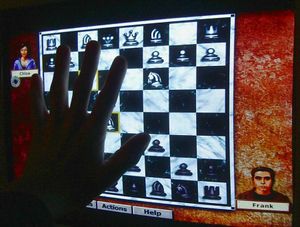
Needless to say, pawnography was cemented in the world's culture from then on. Heck, you were probably conceived after a well placed "Latvian Gambit" or your dad may have discovered your mother's teasing ways with the "Queen's Gambit Declined". Whatever the case, the advent of the internet spread pawnography like wildfire. No screen is safe from such animalistic activity. Heck, I bet even you do it you disgusting bastard. You like to look at little pawns? You should be ashamed. What would your mother say? Absolutely disgusting.
Notes
- ↑ The Vatican decreed a ban on all child pawnography sets and confiscated them for
their own personal usedestruction. - ↑ Complete (bass-ackwardness forgiven) and in really good condition.
- ↑ And not just from sitting too close to the television either!
- ↑ Well apart from the special 1801 special edition "Minstrel Pawnography" limited edition set.
- ↑ As well as women's having heard of the blacks' "enhanced" parts of their bodies.
- ↑ This was chronicled in Martin Lawrence's movie The Black Knight. Neigh indeed!
- ↑ Well, they do get to sit at the front of the bus now.
